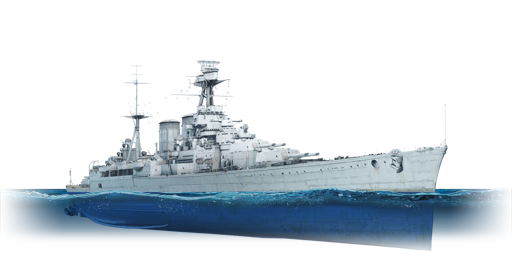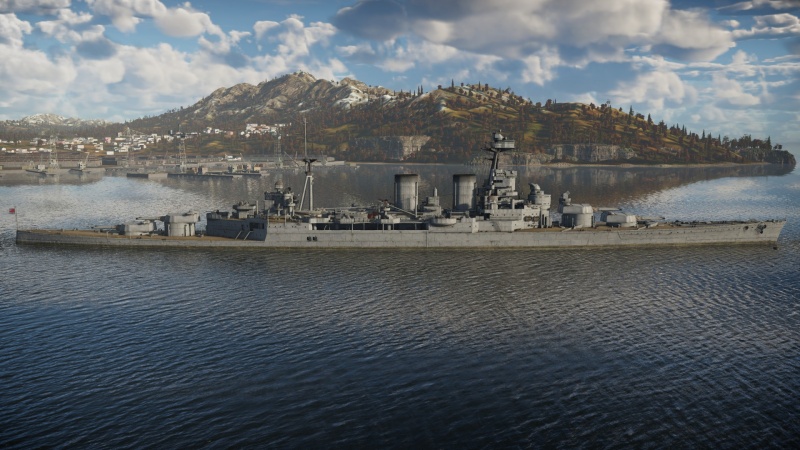Difference between revisions of "HMS Hood"
(Edits) |
|||
| Line 8: | Line 8: | ||
The '''{{Specs|name}}''' is a rank {{Specs|rank}} British battlecruiser {{Battle-rating}}. It was introduced in [[Update "Danger Zone"]]. | The '''{{Specs|name}}''' is a rank {{Specs|rank}} British battlecruiser {{Battle-rating}}. It was introduced in [[Update "Danger Zone"]]. | ||
| − | Conceptualized during World War I as the ultimate "super dreadnought" to counter any Imperial German | + | Conceptualized during World War I as the ultimate "super dreadnought" to counter any Imperial German ship, the Admiral-class battlecruiser underwent several redesign (including being downgraded from the originally intended battleship design) before being finalized in 1918. The HMS Hood, the sole completed ship of the class, represents a compromise between her ambitious design and the financial downturn after the Great War that forced the British to reduce her capabilities. |
| + | |||
| + | Nevertheless, when the "Mighty Hood" was launched in 1920, she became the largest and heaviest warship in the world, a title she held until 1938 when the Japanese launched the Yamato-class battleship. Due to this, the HMS Hood became the status symbol of the might of the British Empire and a pride of the Royal Navy, up until the fateful battle at the Denmark Strait in 1941. | ||
| − | |||
== General info == | == General info == | ||
=== Survivability and armour === | === Survivability and armour === | ||
Revision as of 23:17, 16 June 2022
Contents
Description
The Admiral-class, HMS Hood (51), 1941 is a rank British battlecruiser with a battle rating of (AB), (RB), and (SB). It was introduced in Update "Danger Zone".
Conceptualized during World War I as the ultimate "super dreadnought" to counter any Imperial German ship, the Admiral-class battlecruiser underwent several redesign (including being downgraded from the originally intended battleship design) before being finalized in 1918. The HMS Hood, the sole completed ship of the class, represents a compromise between her ambitious design and the financial downturn after the Great War that forced the British to reduce her capabilities.
Nevertheless, when the "Mighty Hood" was launched in 1920, she became the largest and heaviest warship in the world, a title she held until 1938 when the Japanese launched the Yamato-class battleship. Due to this, the HMS Hood became the status symbol of the might of the British Empire and a pride of the Royal Navy, up until the fateful battle at the Denmark Strait in 1941.
General info
Survivability and armour
Talk about the vehicle's armour. Note the most well-defended and most vulnerable zones, e.g. the ammo magazine. Evaluate the composition of components and assemblies responsible for movement and manoeuvrability. Evaluate the survivability of the primary and secondary armaments separately. Don't forget to mention the size of the crew, which plays an important role in fleet mechanics. Save tips on preserving survivability for the "Usage in battles" section. If necessary, use a graphical template to show the most well-protected or most vulnerable points in the armour.
Mobility
Write about the ship's mobility. Evaluate its power and manoeuvrability, rudder rerouting speed, stopping speed at full tilt, with its maximum forward and reverse speed.
| Mobility Characteristics | |||
|---|---|---|---|
| Game Mode | Upgrade Status | Maximum Speed (km/h) | |
| Forward | Reverse | ||
| AB | |||
| Upgraded | |||
| RB/SB | |||
| Upgraded | |||
Modifications and economy
Armament
Primary armament
Provide information about the characteristics of the primary armament. Evaluate their efficacy in battle based on their reload speed, ballistics and the capacity of their shells. Add a link to the main article about the weapon: {{main|Weapon name (calibre)}}. Broadly describe the ammunition available for the primary armament, and provide recommendations on how to use it and which ammunition to choose.
Secondary armament
Some ships are fitted with weapons of various calibres. Secondary armaments are defined as weapons chosen with the control Select secondary weapon. Evaluate the secondary armaments and give advice on how to use them. Describe the ammunition available for the secondary armament. Provide recommendations on how to use them and which ammunition to choose. Remember that any anti-air armament, even heavy calibre weapons, belong in the next section. If there is no secondary armament, remove this section.
Anti-aircraft armament
An important part of the ship's armament responsible for air defence. Anti-aircraft armament is defined by the weapon chosen with the control Select anti-aircraft weapons. Talk about the ship's anti-air cannons and machine guns, the number of guns and their positions, their effective range, and about their overall effectiveness – including against surface targets. If there are no anti-aircraft armaments, remove this section.
Additional armament
Describe the available additional armaments of the ship: depth charges, mines, torpedoes. Talk about their positions, available ammunition and launch features such as dead zones of torpedoes. If there is no additional armament, remove this section.
Usage in battles
Describe the technique of using this ship, the characteristics of her use in a team and tips on strategy. Abstain from writing an entire guide – don't try to provide a single point of view, but give the reader food for thought. Talk about the most dangerous opponents for this vehicle and provide recommendations on fighting them. If necessary, note the specifics of playing with this vehicle in various modes (AB, RB, SB).
Pros and cons
Summarise and briefly evaluate the vehicle in terms of its characteristics and combat effectiveness. Mark its pros and cons in the bulleted list. Try not to use more than 6 points for each of the characteristics. Avoid using categorical definitions such as "bad", "good" and the like - use substitutions with softer forms such as "inadequate" and "effective".
Pros:
Cons:
History
Describe the history of the creation and combat usage of the ship in more detail than in the introduction. If the historical reference turns out to be too long, take it to a separate article, taking a link to the article about the ship and adding a block "/History" (example: https://wiki.warthunder.com/(Ship-name)/History) and add a link to it here using the main template. Be sure to reference text and sources by using <ref></ref>, as well as adding them at the end of the article with <references />. This section may also include the ship's dev blog entry (if applicable) and the in-game encyclopedia description (under === In-game description ===, also if applicable).
Media
Excellent additions to the article would be video guides, screenshots from the game, and photos.
See also
Links to articles on the War Thunder Wiki that you think will be useful for the reader, for example:
- reference to the series of the ship;
- links to approximate analogues of other nations and research trees.
External links
Paste links to sources and external resources, such as:
- topic on the official game forum;
- other literature.
| Britain battlecruisers | |
|---|---|
| Invincible-class | HMS Invincible |
| HMS Queen Mary* | |
| Renown-class | HMS Renown · HMS Repulse |
| Courageous-class | HMS Glorious |
| Admiral-class | HMS Hood |
| * Unique ship | |





